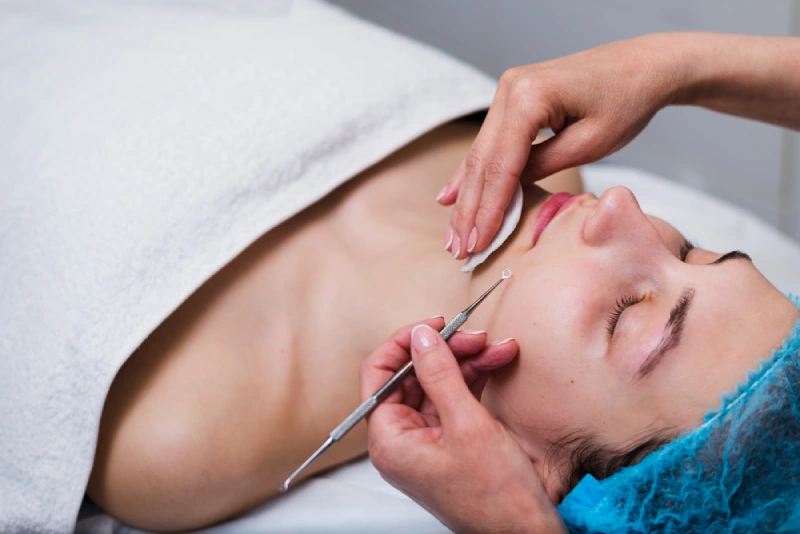Aging and its causes
Age is a natural process that changes our skin. Over time, factors like sun exposure, genetics, and lifestyle habits can result in visible signs such as wrinkles, fine lines, and loss of skin elasticity. This phenomenon, commonly called ‘aging’, is a testament to life’s journey. But what if there was a way to soften these signs, giving the skin a refreshed and youthful look?
Enter the realm of Integrative skin treatments. At its core, the goal is to preserve the skin’s health and vitality. It’s not about turning back the clock but enhancing one’s natural beauty by addressing the external and internal signs of aging. It focuses on promoting skin wellness, rejuvenation, and radiance. While often recognized through physical signs like wrinkles or graying hair, the roots of aging delve much deeper, impacting our cells, tissues, and organs.
Several factors influence how and why we age:
- Genetic Factors: Our DNA contains a blueprint of our lifespan. Certain genes, known as longevity genes, control the process of fixing damages that can occur to our DNA over time. However, over the years, the efficiency of these genes can diminish, leading to accelerated aging.
- Cellular Senescence: As cells age, they lose their ability to divide and function. Over time, these senescent cells accumulate, affecting the body’s ability to regenerate and repair tissues.
- Oxidative Stress: Our bodies constantly produce free radicals as by-products of various cellular activities. These free radicals can damage our cells. While the body neutralizes these radicals with antioxidants, the balance can tip with age, leading to oxidative stress and contributing to aging.
- Environmental and Lifestyle Factors: Prolonged exposure to harmful UV rays, pollution, smoking, and poor dietary habits can fast-track the aging process. These external elements introduce additional stress and damage to the body, both cellular and broader physiological functions.
- Hormonal Changes: As we age, there’s a decline in the production of essential hormones like estrogen and testosterone. These hormones play a significant role in maintaining skin elasticity, muscle strength, and bone density.
- Glycation: Intake of high glycemic index foods and sugars, as well as stress and environmental exposures, can lead to premature aging via a process called glycation. This process breaks down protein and tissues prematurely, altering many bodily systems, including premature aging of the skin.
Wrinkles and their causes
Wrinkles are natural folds or creases that appear on the skin over time. They’re a universal sign of aging, similar to the life stories etched on our faces. Think of them as bookmarks, indicating chapters of sun-soaked memories, heartfelt laughter, and even those contemplative moments.
The science behind wrinkles is rooted in the skin’s structure. Our skin has several layers: the outermost epidermis, the middle dermis, and the innermost subcutaneous layer. When we’re young, our skin is rich in proteins called collagen and elastin, which give it strength and flexibility. As we age, the production of these proteins slows down, and the existing ones start to break down due to factors like sun exposure, smoking, and even repeated facial expressions. The result? The skin becomes thinner, less elastic, and less able to retain moisture, leading to the formation of wrinkles.
While they are a natural part of aging, understanding what causes them can help better manage their appearance.
- Sun Exposure: Ultraviolet (UV) light from the sun breaks down the skin’s connective tissues (collagen and elastin fibers). This breakage causes the skin to lose strength and flexibility, leading to premature wrinkles. That’s why individuals who spend much time in the sun often develop wrinkles earlier than others.
- Stress: Chronic stress creates harmful free radicals that can damage the natural collagen and other supportive proteins in the skin. In addition to affecting internal organs and mental health, it can lead to premature aging and wrinkling in the skin.
- Repeated Facial Expressions: Habitual facial movements like smiling, frowning, or squinting, cause fine lines and wrinkles. A groove forms beneath the skin’s surface each time we use a facial muscle. As the skin ages and loses its elasticity, it no longer springs back into place, making these grooves more permanent.
- Smoking: The harmful chemicals in tobacco can accelerate skin aging. Smoking reduces blood flow to the skin and depletes oxygen and vital nutrients. Furthermore, repeated pursing of lips and squinting to keep smoke out of the eyes can contribute to wrinkles.
- Poor Nutrition: Lack of essential vitamins and minerals in the diet can compromise its health, leading to wrinkles.
Integrative treatment for Wrinkles
The passage of time and the effects of our environment can leave marks on our skin in the form of wrinkles. At Nature of Skin Dermatology in Austin, Texas, we believe in a comprehensive approach to combat these signs of aging. Our team of dedicated dermatologists and medical practitioners combine time-tested methods with innovative treatments to offer integrative solutions. With a deep understanding of skin health, they are committed to providing personalized care, ensuring every patient receives the best possible outcome for a radiant complexion.
Lifestyle Modifications
The choices we make every day greatly influence how our skin ages over time. An integrative approach, combining the wisdom of age-old practices with modern science, emphasizes the importance of making holistic changes in our lifestyle to combat wrinkles and signs of aging effectively.
Nutrition
The food we consume is the cornerstone of youthful skin. Nutrition plays a major role in determining our skin’s health and its resistance to aging. A diet abundant in fresh fruits and vegetables provides essential vitamins, minerals, and antioxidants. These components combat free radicals, which are largely responsible for premature aging and skin damage. Whole grains, on the other hand, are packed with fiber that aids digestion, promoting better nutrient absorption. Including lean proteins, like fish and chicken, ensures the body gets amino acids, which are the building blocks of collagen – a protein vital for skin elasticity.
Dietary Supplements
While a balanced diet is key, specific dietary supplements can further boost our anti-aging efforts. Supplements and vitamins C and E, both oral and topical can provide added defense against environmental damage.
Preventive Screenings
By placing a strong emphasis on early preventive measures, we are dedicated to ensuring that patients remain not just youthful in appearance but vibrant in health as well. Here’s how we prioritize prevention:
- Active Screening: before aging problems and wrinkles become evident, our specialists carry out routine screenings to identify any early signs of potential problems. This proactive approach allows for timely interventions.
- Early Diagnosis: we recognize symptoms before they escalate. A timely diagnosis can drastically alter the course of a condition, ensuring treatments are more effective and less invasive.
- Prompt Intervention: We believe in swift action once a potential issue is identified. Early treatments often translate to faster recoveries and reduced long-term complications.
Regenerative Protocols
Our dermatologists use regenerative protocols to turn the tide in our favor.
Cellular Rejuvenation: The core principle of anti-aging medicine is rejuvenating the body’s cells. Ensuring our cells are robust and healthy, we pave the way for a youthful glow that starts from within.
Upstream Anti-Aging Treatments: Rather than merely addressing the visible symptoms of aging, upstream treatments focus on the root cause. By targeting aging at its source, which is the cellular level, we ensure long-lasting results.
Harnessing Modern Medical Technologies: The field of aging and regenerative medicine is rapidly evolving, and at Nature of Skin Dermatology, we pride ourselves on staying ahead of the curve. We utilize advanced medical technologies to stimulate your body’s cells, urging them back into thriving vitality.
Stress Management
Chronic stress is one of the overlooked factors that can drastically affect the pace of aging. The wear and tear of stress on our bodies is not just symbolic; it has genuine physical implications.
- Stress and Aging: Chronic stress releases a consistent stream of cortisol, a hormone that, over time, can lead to reduced skin elasticity and collagen breakdown. This is why people under continuous stress might notice more wrinkles, fine lines, and other signs of aging.
- Meditation: This age-old practice is more than just a mental exercise. Regular meditation sessions can reduce cortisol levels, calming the mind and allowing the body to recover from daily stressors. Over time, it can lead to a visible reduction in signs of stress-related aging.
- Yoga: Yoga offers a deep connection between mind and body. Through various postures and breathing techniques, it helps alleviate tension, balance hormones, and restore a sense of calm, supporting youthful skin.
- Deep Breathing Exercises: Deep breathing exercises can instantly reduce stress. By taking slow, deliberate breaths, we increase oxygen supply, which aids in cellular repair and regeneration.
Acupuncture
While acupuncture has been around for thousands of years, its application as an anti-aging treatment is gaining traction.
Procedures
Several procedures can be helpful for stimulating regeneration of the skin and treating fine lines and wrinkles.
- Microneedling: This boosts collagen production, a vital protein for skin elasticity and youthfulness, by creating minor disruptions on the skin’s surface.
- Platelet rich plasma: A procedure where we use growth factors naturally found in your blood to stimulate your skin to regenerate and restore its integrity. Paired with microneedling, this can be an effective and safe procedure to maintain your skin’s health.
- Laser resurfacing: Concentrated light from a laser can help to stimulate the skin to renew and restore its inner radiance. These procedures are best paired with an effective skin care routine.
Vitamins
The potential of vitamins to enhance skin health is undeniable. Proper supplementation can work wonders, but being informed and selective is essential.
These are the vitamin powerhouses for the Skin, look for these wrinkle-blasting ingredients in your skincare products:
- Vitamin A: Often found in skincare products, it helps reduce the appearance of fine lines.
- Vitamin C: Known for its antioxidant properties, it can brighten and protect the skin.
- Vitamin D: While mostly obtained from sunlight, it plays a role in skin cell metabolism.
- Vitamin E: A potent moisturizer and antioxidant.
- Curcumin: An anti-inflammatory agent found in turmeric.
- Green Tea Polyphenols: Powerful antioxidants that can combat skin aging.
- Coenzyme Q10: Aids in the skin’s regeneration process.
- Pre- and Probiotics: Beneficial for maintaining a balanced skin microbiome.
Consultation is Key: As with any new regimen, discussing it with our integrative practitioners before starting a new regimen is crucial. We ensure that you choose high-quality vitamins and supplements from trusted sources.
Begin Your Journey to Radiant, Clear Skin at Nature of Skin Dermatology
Our integrative dermatologist team believes in blending the best of holistic dermatology with the precision of modern science. We understand the power of modern dermatology methods and how they can gently yet effectively address the concerns of aging and wrinkles. As experts in integrative dermatology, we assess not just the surface but delve deeper, understanding the intricacies of your skin.
Ready to embark on a journey to timeless beauty? Discover the harmonious blend of nature and science with us, and let your skin reflect your inner vitality! Schedule your appointment today!
Book A Consultation
Disclaimer: The information provided on the site is for educational purposes only, and does not substitute for professional medical advice. Consult a medical professional or healthcare provider if you are seeking medical advice, diagnoses, or treatment.





